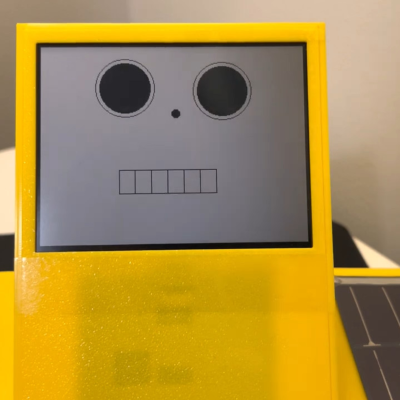The last couple years have seen an incredible flourishing of the cyberdeck scene, and probably for about as many reasons as there are individual ’deck designs. Some people get really into the prop-making, some into scrapping old tech or reusing a particularly appealing case, and others simply into the customization possibilities. That’s awesome, and they’re all different motivations for making a computer that’s truly your own.
But I really like the motivation and sentiment behind [Andreas Eriksen]’s PotatoP. (Assuming that his real motivation isn’t all the bad potato puns.) This is a small microcomputer that’s built on a commonly available microcontroller, so it’s not a particularly powerful beast – hence the “potato”. But what makes up for that in my mind is that it’s running a rudimentary bare-metal OS of his own writing. It’s like he’s taken the cyberdeck’s DIY aesthetic into the software as well.
 What I like most about the spirit of the project is the idea of a long-term project that’s also a constant companion. Once you get past a terminal and an interpreter – [Andreas] is using LISP for both – everything else consists of small projects that you can check off one by one, that maybe don’t take forever, and that are limited in complexity by the hardware you’re working on. A simple text editor, some graphics primitives, maybe a sound subsystem. A way to read and write files in flash. I don’t love LISP personally, but I love that it brings interactivity and independence from an external compiler, making the it possible to develop the system on the system, pulling itself up by its own bootstraps.
What I like most about the spirit of the project is the idea of a long-term project that’s also a constant companion. Once you get past a terminal and an interpreter – [Andreas] is using LISP for both – everything else consists of small projects that you can check off one by one, that maybe don’t take forever, and that are limited in complexity by the hardware you’re working on. A simple text editor, some graphics primitives, maybe a sound subsystem. A way to read and write files in flash. I don’t love LISP personally, but I love that it brings interactivity and independence from an external compiler, making the it possible to develop the system on the system, pulling itself up by its own bootstraps.
Pretty soon, you could have something capable, and completely DIY. But it doesn’t need to be done all at once either. With a light enough computer, and a good basic foundation, you could keep it in your backpack and play “OS development” whenever you’ve got the free time. A DIY play OS for a sandbox computing platform: what more could a nerd want?
















Hi Elliot! I’m happy you found my project interesting.
I have planned to do a “Philosophy of the project” writeup at some point, but you’ve given me a head start here – You are spot on about some of the things that have been on my mind as I have worked on it.
The idea of “truly personal computing” really appeals to me – having a computer that I can fully know and understand (or at least pretend to, at some level). This also includes the long-term perspective where what you have created is not as easily destroyed by forced software upgrades, hardware obsolescence, deprecated standards, libraries and frameworks.
There is a lot of overlap here with both the Permacomputing ( https://permacomputing.net ) and UXN ( https://100r.co/site/uxn_design.html ) communities, and I encourage anyone interested in this topic to have a read through these sites.
As for self-hosting, currently I am chained to my conventional computer for making changes to the firmware and language implementation. That is perhaps unlikely to change with the current prototype, although there is still a multitude of things I can use it for. This could change if I am able to improve the software or hardware significantly.
In the end, this project is about doing more with less, and I hope it can inspire others to follow that line of thinking a little more often.
Not quite as friendly looking as a Banana Jr 6000 =)
🤣 ahhhh … hadn’t thought about the Banana Jr 6000 in years!
Second $129. Lenovo Ideapad 1i Celeron N5030 4+0 cores, 1.1/3.0 GHz, 4/128 GB emmc, 1 usb c, 1 usb 2.0, 1 usb 3.0,SD car reader, hdmi reach Windows 11 for pickup at Walmart.
Runs Ubuntu. First now running Windows 10 1909 … after installing Ubuntu to destroy Windows 11 software designed to prevent 10 installation.
10 reomsall required to fix MIcrosoft holding N5030 speed to 1.09GHz.
Compputing moire fun at these prices?
Translation please?
With similar goals in mind, I have just started making a collection of development tools in MicroPython (https://github.com/ncrawforth/VT2040-utils). Having a text editor makes a huge difference for writing code on a machine like this.
nice, but too fat and too heavy
i need normal system for example fuzix
or linux O64 is ok
Imagine how disappointed the creator will be, that the one target user they must have had in mind has now judged them to have missed the mark.
Agreed that the negativity is unwarranted. However, after reading the creator’s own reply to this post, it seems like the one target user for this system – is the creator themself. More of an educational project, which may eventually become complete enough to have real-world utility.